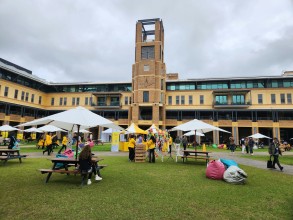News & Blogs
Studying Abroad on a Budget: Tips and Tricks

Introduction: Why Budgeting Matters When Studying Abroad
Studying abroad is an exciting adventure. You get to live in a new country, learn new things, and meet people from all over the world. But one important thing students often forget is budgeting — planning how to use their money wisely. When you study abroad, money doesn’t grow on trees! It’s important to know where your money goes and how to save so you don’t run out.
Without a good plan, students can spend too much on things like food, transport, or fun activities and face money problems. This can make studying and living in a new country stressful. But with smart budgeting tips and advice, you can enjoy your time abroad without worrying about money.
Global Education Counselling Centre (GECC) helps many students from Nepal learn how to study abroad on a budget. GECC shares helpful study abroad tips so students can live well, save money, and focus on their studies and experiences.
Remember, good budgeting means you have more freedom to enjoy your study abroad journey without stress. In this article, we will share simple and useful ideas to help you manage your money smartly while studying abroad.
Planning Your Finances Before You Go

Before you leave your home country to study abroad, it is very important to plan your money carefully. This means knowing how much money you will need for things like tuition fees, rent, food, and travel. Planning ahead helps you avoid surprises and keeps you from spending too much.
First, research the cost of living in the country where you will study. Some places are more expensive than others. For example, cities like London or New York can cost more than smaller towns. Knowing these costs helps you make a good budget.
Next, make a list of all your expected expenses, including:
- Tuition and school fees
- Accommodation (like dorms or shared apartments)
- Food and groceries
- Transportation (bus, train, or bike)
- Books and school supplies
- Fun activities and emergencies
Try to set a budget for each category. This will help you know how much money to carry or send to your bank account abroad.
Also, look for ways to save money before you go. You can save by cutting small daily expenses or applying for scholarships. The Global Education Counselling Centre (GECC) gives great advice on how to save and plan your money well. They are one of the best consultancies in Kathmandu and provide useful study abroad tips to help students from Nepal prepare financially.
Finally, check if you can work part-time during your studies. Many countries allow students to work some hours each week. This can help you earn extra money while studying, but make sure to balance work and study.
Good planning before you go is the first step to successfully studying abroad on a budget. It helps you stay calm, enjoy your time, and focus on learning.
Budget Planning: Affordable Housing and Living Arrangements

One of the biggest costs when you study abroad is where you live. Finding affordable and comfortable housing can save you a lot of money. There are different types of places you can stay, and each has its own good and not-so-good points.
1. University Dormitories:
Many universities offer dorm rooms for students. These are usually cheaper than renting an apartment. Dorms are also great for meeting other students and joining social activities. However, you may have to share bathrooms or kitchens, and rules can be strict.
2. Shared Apartments:
Sharing an apartment with other students is another popular option. You split the rent and bills, so it becomes more affordable. Living with roommates can also help you make friends and feel less lonely. Just make sure you find trustworthy roommates and a safe place to live.
3. Homestays:
Some students choose to live with a local family in a homestay. This can be a bit more expensive, but it offers a unique chance to practice the local language and learn about the culture. Homestays often include meals and laundry, which can save money in other ways.
4. Renting Your Own Apartment:
If you want more privacy, renting your own place is an option, but it is usually the most expensive. Be careful to check the rent, utilities, and contract terms before signing anything.
How GECC Can Help
Global Education Counselling Centre (GECC) helps by guiding students on choosing the best and most affordable housing options. As one of the best consultancies in Kathmandu and a trusted consultancy in Nepal, GECC helps students find safe and budget-friendly homes. They also provide important study abroad tips to manage your living expenses wisely.
Remember, choosing the right housing is a big step to studying abroad on a budget. With the right place, you save money and have a happy, safe home during your studies.
Budget Planning: Smart Spending and Saving Daily

When you study abroad, managing your daily expenses is very important to stick to your budget. Small things like food, transportation, and entertainment can add up fast if you’re not careful. But with some smart choices, you can save money every day and still enjoy your time.
Easy Ways to Save Money Daily:
-
Cook Your Own Meals:
Eating out can be expensive. Try cooking simple meals at home or in your dorm kitchen. It’s cheaper and often healthier. -
Use Student Discounts:
Many places like restaurants, cinemas, museums, and public transport offer discounts for students. Always carry your student ID and ask if there is a discount available. -
Choose Public Transportation or Bike:
Instead of taxis or rideshares, use buses, trains, or even a bike to get around. It’s cheaper and good for your health too! -
Shop Smart:
Buy groceries from local markets or discount stores. Look for sales and use coupons if available. -
Limit Unnecessary Purchases:
Avoid buying things you don’t really need. Before buying, ask yourself if it’s important or if it can wait. -
Find Free or Low-Cost Activities:
Explore free events, parks, or university activities instead of expensive entertainment.
How GECC Supports Smart Spending
Global Education Counselling Centre (GECC) teaches students how to manage money wisely while abroad. Known as one of the best consultancies in Kathmandu and a trusted consultancy in Nepal, GECC provides helpful budget tips and study abroad tips to help students save money every day.
By making smart spending choices, you can enjoy your study abroad experience without worrying about money. Small savings every day lead to big savings over time!
Helpful Resources and Support for Budget Students

Studying abroad on a budget can feel challenging, but you don’t have to do it alone. There are many resources and support systems designed to help students save money and manage their expenses well.
Important Resources to Use:
- Global Education Counselling Centre (GECC):
GECC is one of the best consultancies in Kathmandu and a trusted consultancy in Nepal. We help students plan their budget carefully before going abroad and provide ongoing support during their studies. We also offer advice on scholarships, affordable housing, part-time jobs, and money-saving tips to make your study abroad journey easier. - Budgeting Apps and Tools:
Use simple apps like Mint, Goodbudget, or even Excel spreadsheets to track your spending. These tools help you see where your money goes and remind you to stay within your budget. - University Support Services:
Many universities have offices that help international students with financial advice, emergency funds, or work opportunities. Make sure to visit these services as soon as you arrive. - Student Communities and Groups:
Join student clubs or online groups where you can share tips about saving money, finding affordable places, or even swapping textbooks and other supplies. - Scholarships and Part-Time Jobs:
Look for scholarships that can reduce your tuition fees or living costs. Also, check if your student visa allows you to work part-time to earn extra money.
By using these resources and the guidance from GECC, you can manage your finances smartly and enjoy a worry-free study abroad experience. Remember, good planning and asking for help when you need it are keys to studying abroad on a budget.
Conclusion
Studying abroad is a wonderful opportunity for you to learn, explore, experience and grow. But it’s important to remember that managing your money well is key to making the most of your experience. With good budget tips and careful planning, you can enjoy your study abroad adventure without having to worry about money.
Global Education Counselling Centre (GECC) is here to help you every step of the way. As one of the best consultancies in Kathmandu and a trusted consultancy in Nepal, we provide expert advice and support to help students study abroad on a budget. From planning your finances before you go to finding affordable housing and smart spending, our guidance makes your journey easier and happier, so if you are interested then contact us now, we will be sure to get back to you as soon as possible.
By using these tips and the support from this article, you can have a safe, fun, and successful study abroad experience without breaking your budget. Remember, good money management gives you more freedom to focus on learning and enjoying your new adventure




